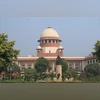The Supreme Court has held that non-appearance in response to a proclamation is a "stand-alone offence" and can continue even if the proclamation is extinguished.
The apex court delivered its verdict on January 2 on an appeal challenging a June 2023 judgement of the Punjab and Haryana High Court.
The bench dealt with legal questions, including whether the proclaimed offender status of an accused under the provisions of the CrPC can subsist if he stands acquitted during trial in connection to the very same offence.
"In conclusion, we hold that section 174A IPC is an independent, substantive offence, that can continue even if the proclamation under section 82 CrPC is extinguished. It is a stand-alone offence," a bench of justices CT Ravikumar and Sanjay Karol said.
Section 82 of the erstwhile Code of Criminal Procedure (CrPC) deals with proclamation for person absconding.
Also Read
Section 174A of the erstwhile Indian Penal Code (IPC) pertains to non-appearance in response to a proclamation under section 82 of the CrPC.
"The purpose of section 82 CrPC, as can be understood from a bare reading of the statutory text is to ensure that a person who is called to appear before a court, does so," the bench said, adding that the object and purpose of section 174A of the IPC was to ensure penal consequences for defiance of a court order requiring a person's presence.
It noted what happens if the status under section 82 of the CrPC was nullified, that is, the person subjected to such proclamation, by virtue of subsequent developments was no longer required to be presented before a court of law.
"Then, can the prosecution still proceed against such a person for having not appeared before a court during the time that the process was in effect. The answer is in the affirmative," it said.
While referring to the language of section 174A of the IPC, the bench said this implies that the "very instance at which a person is directed to appear, and he does not do so, this section comes into play".
"So, while proceedings under section 174A IPC cannot be initiated independent of section 82, CrPC, that is, can only be started post the issuance of proclamation, they can continue if the said proclamation is no longer in effect," the bench said.

)